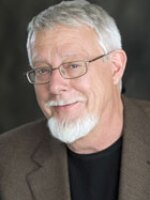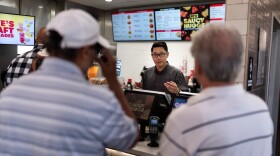RENEE MONTAGNE, host:
Closing arguments are to be delivered today in the first war crimes trial held at Guantanamo Bay, Cuba. Salim Hamdan was one of Osama bin Laden's drivers. He's charged with conspiracy and material support for terrorism, and if convicted could face a life sentence. The government says Hamdan was part of bin Laden's inner circle, and that he'd sworn a personal oath of allegiance to the al-Qaida leader. The defense says he was just a lowly hired driver. NPR's John McChesney reports.
JOHN McCHESNEY: Much of this proceeding has been shrouded in secrecy. The prosecution presented 14 witnesses, most of them FBI agents. Four of their witnesses were anonymous. The defense presented eight witnesses, and two of them testified in closed session because the government said their testimony should be classified. And two other defense witnesses were so-called high- value detainees who answered questions only in writing. Khalid Sheikh Mohammed, the self-confessed architect of 9/11, said that Hamdan was only a driver and wasn't educated enough to participate in planning attacks.
Ben Wizner of the American Civil Liberties Union has been observing this trial, as well as other Guantanamo proceedings over the years. He believes there are two principle reasons these detainees are being tried by military commissions instead of civilian courts.
Mr. BEN WIZNER (American Civil Liberties Union): The first is so that testimony extracted through coercive means - what the rest of the world might call torture - could be used. And that evidence can't be used in other proceedings. The second is that evidence of the crimes committed by the CIA and the Department of Defense against many of these detainees must not be revealed in open court and to the world.
McCHESNEY: All of the 10 federal agents who testified for the prosecution said that Hamdan was cooperative and cordial, although some said they believed he was holding something back. None of them, however, advised him of his rights, because they were told those didn't apply to detainees at Guantanamo.
Colonel Lawrence Morris is the chief prosecutor here.
Colonel LAWRENCE MORRIS (Chief Prosecutor, Hamdan Trial): Although Miranda Rights were not applied, he was questioned in a humane and non-coercive manner by many of these individuals. Because remember what their key concern is. Though those rights properly don't apply there, they certainly want to be able to present reliable evidence.
McCHESNEY: But testimony regarding all of Hamdan's interrogations didn't come up in open court. Although no one who wasn't present knows for sure what those two defense witnesses talked about in closed session, the ACLU's Ben Wizner offers this surmise.
Mr. WIZNER: We know that there is a month - December of 2001 - after Hamdan's capture in which he completely and utterly disappeared. If you believe the testimony in this case, that month did not exist. Now in December, he was obviously being held by the CIA. But there's a rule in the Guantanamo Military Commissions, which is that you're not allowed to use the word CIA, even though the whole world knows that the CIA has been intimately involved in the capture, detention and torture of detainees.
McCHESNEY: At least one of those defense witnesses who testified in closed session was at Bagram Air Force Base in Afghanistan during that missing month.
It's not clear what a conviction or an acquittal would mean in the Guantanamo context, because Hamdan is still classified as an enemy combatant. He could be held here indefinitely, no matter what the verdict. The commander of the Guantanamo detention operation said that if convicted, he will be jailed separately from other prisoners.
Both sides will make closing arguments today. The panel of six officers from various services will deliberate and announce a verdict, and then a separate sentencing hearing will begin.
John McChesney, NPR News, Guantanamo Bay. Transcript provided by NPR, Copyright NPR.






